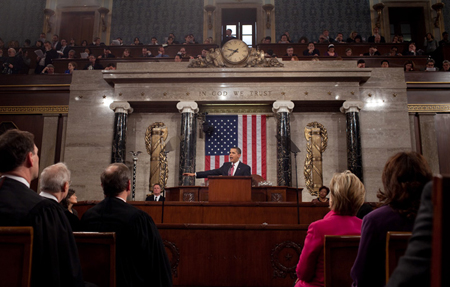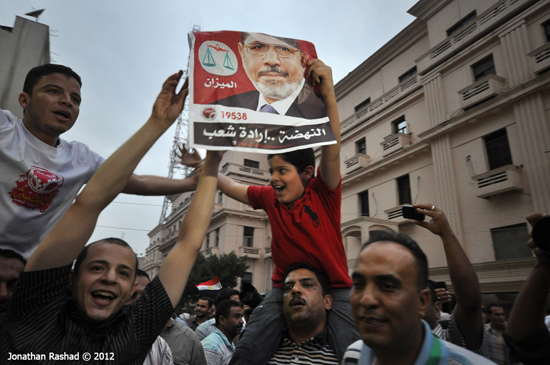On Thursday, Northeastern’s political science department hosted its annual President’s Day lecture in which Professor Michael Tolley spoke about the limits of law on executive power and post-9/11 challenges the president faces. Professor Tolley opened his lecture by explaining that presidents of both major parties have taken actions of questionable legality in the years following 9/11, including enhanced interrogation techniques, increased surveillance, the use of drones, and the continuation of U.S. presence overseas in the name of the war on terror. A recent Gallup poll revealed that most Americans no longer view terrorism as a top priority for the nation and are now more concerned with issues such as the economy, gun control, and healthcare.[1] While President Obama did end the Bush administration’s use of torture on suspected terrorists in secret CIA prisons, he has not kept his promise to shut down the military prison at Guantanamo Bay. The Obama administration has also come under fire recently for the CIA’s targeted killing program and the National Security Agency’s electronic surveillance program. The American public’s increasing awareness of these programs has contributed to President Obama’s dismal approval rating of 42 percent, one of the lowest of his entire presidency.[2]
In order to shed some light on the powers of the president and how we got to where we are today, Professor Tolley looked to history. He explained, “Every attempt to augment the law has the potential to expand the power of the executive as well.” He cited the historical example of the enactment of the War Powers Resolution after the disastrous Vietnam War. The purpose of this law is to check the president’s power and prevent him from committing the U.S. to an armed conflict without Congress’ consent. It allows the president to send American armed forces abroad only with a congressional declaration of war or in the case of a national emergency, such as an attack on the United States. It also forbids troops from remaining abroad for more than 90 days without an authorization of the use of force or a declaration of war. While this law was intended to rein in presidential power, it ended up doing the opposite by sanctioning unilateral war-making by the president for 90 days.
Looking back even further into history, Professor Tolley took us back to the nation’s roots and described how the Articles of Confederation lacked any executive authority. Once the U.S. realized that this method of governing was ineffective, the Articles were replaced by the Constitution, which included provisions for an independent executive. The framers of the Constitution were uncertain about how much power the president should have; they gave him enormous power as the commander-in-chief of the Army and Navy, but his more basic authorities were not enumerated as clearly. For this reason, Professor Tolley deemed the concept of executive power as “inherently indeterminate.” And this is where things start to get slippery, because executive power has a natural tendency toward expansion, especially during times of crisis, like the years following the September 11th attacks. As a result, the nation struggles to find viable checks on executive power.
The lecture then returned to present day as Professor Tolley moved on to discuss the Obama administration’s use of drones against suspected terrorists in Pakistan and Yemen. There have been 318 known drone strikes in Pakistan under President Obama compared to only 46 under George W. Bush. Of these strikes, 535 of the resulting deaths have been civilians, 175 have been children, and 4 have been American citizens.[3] The CIA refers to these unintended casualties as “bug splat.” This brings into question whether the president is overstepping his boundaries in the implementation of this targeted killing program. While the majority of American citizens support the use of drones to kill terrorists, in 2013 the United Nations identified 33 drone strikes that have resulted in civilian casualties and may have violated international humanitarian law.[4] Some would view this is as cause for concern, but as Professor Tolley put it, “When has international law ever stopped the U.S. from doing what it deems to be in its best interests?” He’s definitely on to something there.
Further evidence of the enormity of executive power is George W. Bush’s authorization of eavesdropping on citizens by the NSA shortly after 9/11. The magnitude of this surveillance recently blew up in the agency’s face when whistleblower Edward Snowden exposed the existence of the PRISM surveillance program, which the NSA used to collect private electronic data from Internet users via services like Gmail, Facebook, and Outlook. Is this type of surveillance a violation of Americans’ fourth amendment rights to be protected from unreasonable searches? Some judges say yes, while others say no. This controversy within the judicial system hearkens back to Professor Tolley’s comment about the inherent indeterminacy of executive power.
While prospects for pulling in the reins on presidential power may currently appear bleak, Professor Tolley offered some reasons to be hopeful. In the wake of the public outcry following the perceived abuse of power by the executive, President Obama has made an effort to issue policy corrections. Among these is a new set of guidelines for the targeted killing program. In his May 2013 address, President Obama proposed changes to the program, including extended oversight of strikes through the establishment of a special court that would evaluate and authorize lethal action. An alternative to this plan would be to establish an independent oversight board in the executive branch. The president also reinforced the need to address the underlying conflicts that fuel extremism, and to support transitions to democracy in countries like Libya, Tunisia, and Egypt. President Obama closed with a sentiment that should leave Americans hopeful, stating, “I look forward to engaging Congress and the American people in efforts to refine, and ultimately repeal, the Authorization to Use Military Force’s mandate. And I will not sign laws designed to expand this mandate further. Our systematic effort to dismantle terrorist organizations must continue. But this war, like all wars, must end. That’s what history advises. That’s what our democracy demands.”[5]
More recently, President Obama spoke about new guidelines for NSA surveillance programs. He announced that he would like to end the NSA’s bulk call records program as it currently exists. The president proposed that call data be handled by a private party rather than the NSA, and he also directed the NSA to immediately reduce the number of people whose calls may be monitored. Another goal President Obama communicated was the creation of a process through which NSA analysts would be required to get approval from the surveillance court before requesting phone records. This would force the analysts to prove reasonable suspicion that an American’s phone number was linked to terrorism before they could examine the calling records linked to that number. The president seemed to understand the American public’s grievances that stemmed from the exposure of the scope of NSA surveillance. He attempted to quell their concerns by reaffirming his dedication to transparency and government-constituent trust, stating, “For our intelligence community to be effective over the long haul, we must maintain the trust of the American people and people around the world.”[6]
Now we must wait and see if these new guidelines and regulations are actually enforced. As an American, I certainly hope to see more reforms and policy corrections in the future, as these checks on the government’s power are the last line of defense we have in maintaining our country’s 200-year-old commitment to constitutionalism.
Jaclyn Roache
Political Science and Journalism ’18
[1] http://www.gallup.com/poll/160445/economy-dominant-obama-speech-americans-priorities.aspx
[2] http://politicalticker.blogs.cnn.com/2014/02/17/president-at-42-on-presidents-day/
[4] http://www.theguardian.com/world/2013/oct/18/drone-strikes-us-violate-law-un
[6] http://thecaucus.blogs.nytimes.com/2014/01/17/live-coverage-of-obamas-n-s-a-speech/



